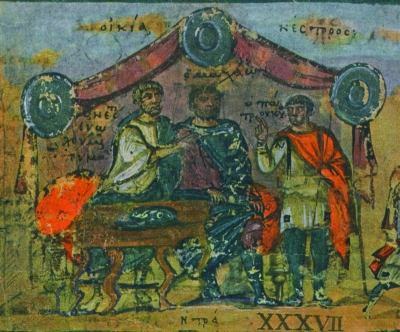
In the 6th century AD, John Malalas wrote a universal chronicle - an account of world history from Adam to his own time. We do not know much about the author himself, who left virtually no traces outside of his chronicle. In the version preserved today, the chronicle likely reached up to the death of Emperor Justinian (565 AD), but due to the loss of some pages in the manuscript, the available text ends two years earlier.
Malalas’s chronicle has an outstanding importance for medieval historiography: subsequent Byzantine chroniclers not only orientated themselves on its structure, but also frequently took over and rewrote parts of its text so that Malalas’s work represents a cornerstone of Byzantine historiography. The chronicle, which in its first books retells biblical history woven into historical and mythological traditions of antiquity, also deals - after the Roman royal period, the history of Alexander and his successors and the reign of Augustus - with the Roman imperial period in increasing detail, focusing on the decades that the author himself experienced, i.e. the reigns of the emperors Zeno (474-491), Anastasios (491-518), Justin I (518-527) and Justinian (527-565). This historical work is therefore a fundamental primary source for the 6th century in particular, while also providing important information for earlier periods.
The work has not yet been sufficiently exploited by researchers. The task of the Academy research group is to close this gap. At the heart of the project is the development of a comprehensive philological-historical commentary on the chronicle; at the same time, the text is to be analysed, contextualized, and given a better understanding through special individual studies. The project thus also serves the purpose of significantly expanding our knowledge of late antique and early Byzantine history and historiography.

